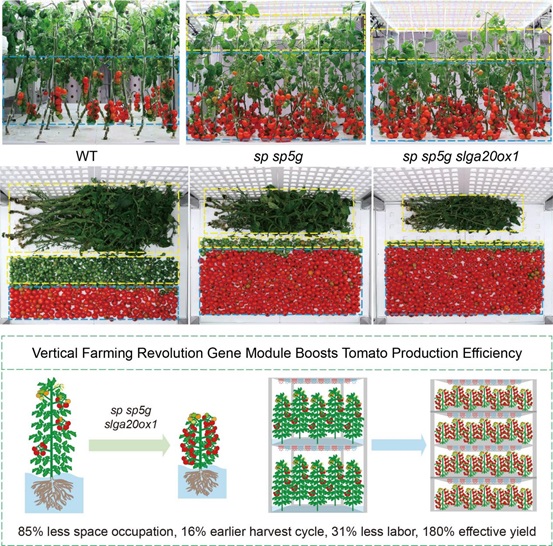
CAS Experts Optimize Tomato Production for Vertical Farming
June 11, 2025| |
Researchers from the Chinese Academy of Sciences successfully engineered tomato germplasm optimized for vertical farming. The study, published in the Journal of Integrative Plant Biology, harnessed genome editing to integrate Green Revolution gene homologs and anti‐florigen genes into tomato plants.
Vertical farming is an innovative technique that combines controlled-environment agriculture with vertical cultivation approaches for industrial-scale crop production. The major challenges that cause delays in the industrial-scale expansion of vertical farming include excessive energy demands and limited availability of crop varieties fit for indoor cultivation. To address these concerns, the researchers aggregated the Green Revolution gene homologs GA20ox with anti-florigen genes SP and SP5G, which led to the development of a molecular module set to revolutionize vertical farming.
Through genome editing, the scientists knocked out the tomato SlGA20ox1 gene, which modified the tomato plant's architecture characterized by short stems and a compact canopy. This modification decreased the space needed by 75% in multi-layer LED hydroponic systems. The space-saving benefit also led to a 38-69% increase in fruit yield due to high-density planting and efficient light use. Further modifications, combining the SlGA20ox1 mutation with SP and SP5G genes, resulted in an even more compact plant, which reduced space occupancy by 85%, shortened the harvest cycle by 16%, and dramatically increased effective yield by 180% in commercial vertical farms.
Read more results from the CAS website.
| |
You might also like:
- Researchers Develop Tomato Plants that Contain Full Genetic Material of Both Parent Plants
- Scientists Identify Tomato Plants' Mechanism for Heat Tolerance
- Experts Use Genome Editing to Make Tomatoes Yield Earlier
Biotech Updates is a weekly newsletter of ISAAA, a not-for-profit organization. It is distributed for free to over 22,000 subscribers worldwide to inform them about the key developments in biosciences, especially in biotechnology. Your support will help us in our mission to feed the world with knowledge. You can help by donating as little as $10.
-
See more articles:
-
Plant
- Australia's Gene Regulator Approves Field Trial of GM Safflower
- Camelina Engineered to Produce High Levels of Natural Astaxanthin
- USDA-APHIS Designates Cibus's Herbicide Tolerance Canola Trait HT2 as Not Regulated
- Regulatory Challenges Slow India’s Progress on GM Crop Adoption
- Save the Date: ASCA8 in Manila - September 2025
- Experts Urge EU to Allow NGTs in Organic Farming
- CAS Experts Optimize Tomato Production for Vertical Farming
-
Health
- EPA Announces Approval of GM Cholera Vaccine in New Zealand
-
Read the latest: - Biotech Updates (January 28, 2026)
- Gene Editing Supplement (January 28, 2026)
- Gene Drive Supplement (February 22, 2023)
-
Subscribe to BU: - Share
- Tweet

